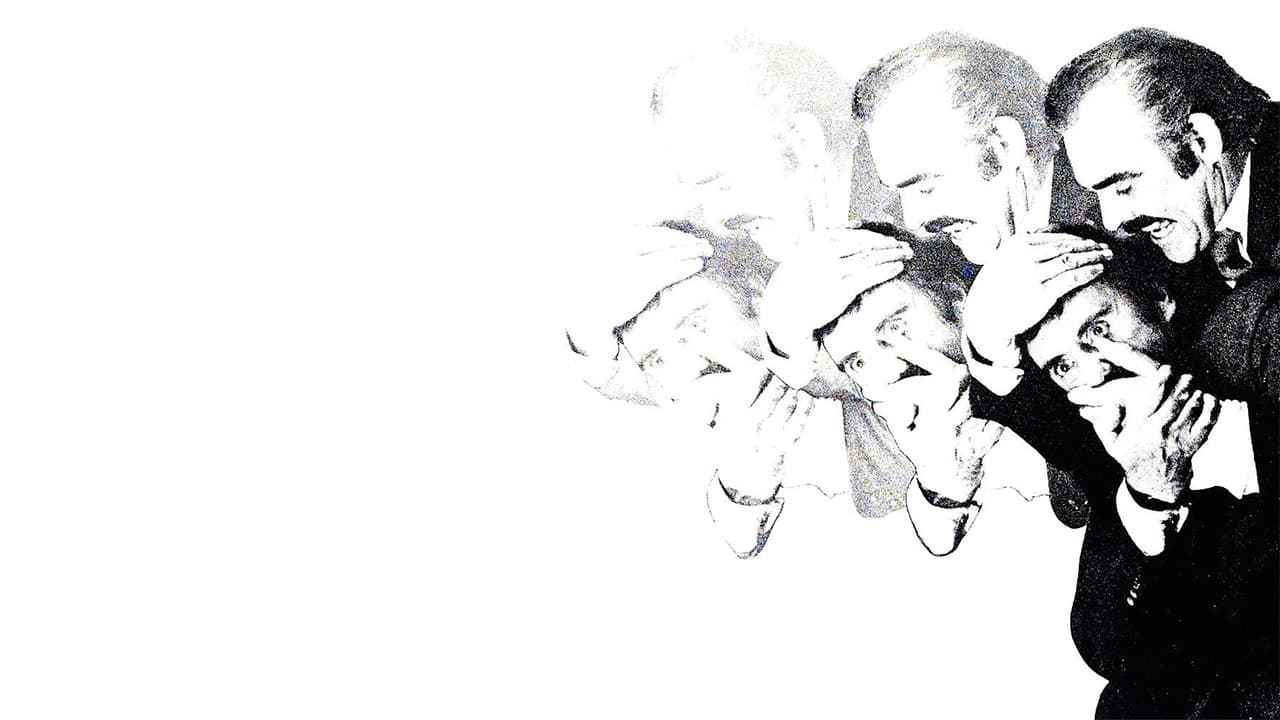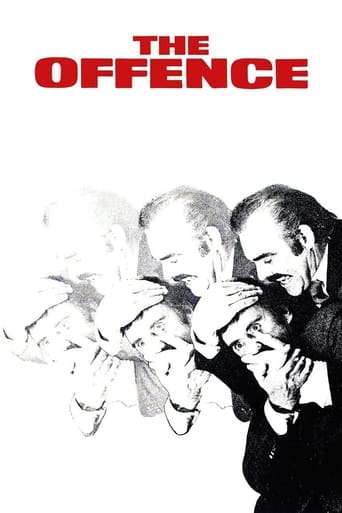

Excellent, Without a doubt!!
... View MoreDreadfully Boring
... View MoreAfter playing with our expectations, this turns out to be a very different sort of film.
... View MoreIt's a movie as timely as it is provocative and amazingly, for much of its running time, it is weirdly funny.
... View MoreBritish film adaptation of John Hopkins' play "This Story of Yours", penned by the playwright, concerns a troubled 20-year veteran of the police force privately interrogating a suspicious-seeming man picked up the same night a schoolgirl was found molested in the woods. The accused almost inadvertently manages to get inside the other man's head until the tables are turned and it's the cop who is suddenly examining his own dark, turbulent thoughts (he's forced to see the ugly truth, that the two men are not unlike each other). Extremely heavy (as it must be) and unrelievedly talky, the film, directed by Sidney Lumet, is a psychological think-piece, one that was very important to its star, Sean Connery. Erasing all traces of James Bond, Connery sinks deep into this tortured character, with Ian Bannen riveting as the suspect. The film begins confusingly, and audiences must get over another hurdle: a second-act argument between Connery and his wife that eats up a lot of time on the clock. Those who stick with it, however, will find the adult material tense, intriguing and haunting. **1/2 from ****
... View More"The Offence" is a gripping psychological drama starring Sean Connery, who plays Detective Sergeant Johnson. Johnson gets into a lot of hot water when he goes overboard and beats the almighty hell out of a suspect, Kenneth Baxter (Ian Bannen). Baxter seems a likely candidate to be the monster responsible for a series of assaults on children. The film begins with the immediate aftermath of the beating, then details the events leading up to it. An interrogator, Cartwright (Trevor Howard), is called in to grill Connery and get him to explain himself.Written by John Hopkins, based on his play, this film does betray a certain staginess. It's also going to be too deliberately paced for some tastes. And, in the end, it wasn't hard for this viewer to guess where the story was going. But even taking those things into account, there's a palpable level of tension in "The Offence" right from the start. It also has a striking look, because, with few exceptions, director Sidney Lumet and cinematographer Gerry Fisher avoid strong primary colours.Where Lumet succeeds the most is in getting some exceptional performances out of his actors. In exchange for agreeing to reprise the role of James Bond (for "Diamonds are Forever"), Connery had insisted that he get to do two smaller budgeted projects of his own choosing. "The Offence" was one, and an adaptation of "Macbeth" was the other; however, the latter project never came to fruition because "The Offence" didn't fare too well at the box office, and Roman Polanski beat Connery to the punch with his own version of "Macbeth".Connery, who'd also shined for Lumet in "The Anderson Tapes", is mesmerizing here. He's matched by the equally powerful Howard, and the pathetic (yet also perceptive) Bannen. Praise also goes to Vivien Merchant, in the role of Johnsons' wife. Connery has scenes with all three where you can just get lost in the performances.Overall, an intense study of a forceful, angry character.Seven out of 10.
... View MoreSean Connery is more a superstar than an actor. Although his talents have been recognised by the Academy (for his rather unconvincing turn as an Irish cop in The Untouchables (1987)) and remembered for his role as the first James Bond, he is high up on his own pedestal, a gift for voice actors and one of the handsomest faces ever to have graced the screen. But anyone in doubt of his ability as a proper thespian need look no further than his grim, tormented portrayal of a cop who has seen one too many dead bodies in Sidney Lumet's The Offence, a huge flop at the box office and a film now faded into memory, ripe for a re-discovery.Playing with time Rashomon (1950)-style, the film begins in slow motion, where an unknown disturbance at a police station has a few officers panicked. It is revealed to be Detective Sergeant Johnson (Connery) standing over the bloodied body of suspect Kenneth Baxter (Ian Bannen), with fellow police officers scattered on the floor. It then goes back, and we are in a grey, miserable city gripped in panic as a child-killing paedophile roams free. The latest disappearance of a young girl has Johnson riled, and officers cruising the street pick up Baxter, who is wandering alone in the night covered in mud. The young girl is found raped but alive by Johnson himself, who insists on spending some time alone with the suspect.Based on John Hopkins' stage play This Story of Yours, Connery fought tooth-and-nail to adapt it for the big screen, eventually reprising his role as Bond in Diamond Are Forever (1971) in return for the green-light. Although the film consists of long, talky scenes, Lumet uses stylish editing in order to avoid being stagy and to delve further into his anti-hero's head. His reputation as a no- nonsense director betrays him here, as scenes of gruesome murders, body parts, and a host of other atrocities Johnson has witnessed flash before our eyes. The use of slow motion in the flashback moments also employs a sort of circular filter at the centre of the screen, reflecting Johnson's disconnection from his actions but getting slightly tiresome in the process.There are three long, outstanding scenes. The first is Johnson returning home to his wife (Vivien Merchant) following his interrogation of Baxter, drinking heavily and exploding at the one person who could possibly help him. The second is Johnson's own interrogation with superintendent Cartwright (the ever-excellent Trevor Howard), a man who has witnessed the same level of horror himself, but has learnt to separate his work from his life, something Johnson is unable to do. The third is the extended interrogation of Baxter, where Bannen's creepy turn surely must have been an inspiration for the Joker-Batman verbal showdown in The Dark Knight (2008). It's incredibly bleak stuff, but the raw honesty of the script and performances makes this powerful stuff.www.the-wrath-of-blog.blogspot.com
... View MoreThe Offence is based on a play, and it shows. Very few locations- interrogation room, police quarters, a few outdoor scenes, Johnson's home- are punctuated by a whole lot of men (and one woman in a scene) talking in rooms. This doesn't dissuade a director like Sidney Lumet, however, who feeds the fire that actors crave, which is freedom to take some risky material anywhere it needs to go. In this case it's about a detective who is on a child murder/raper case who in the midst of the manhunt finds in one night a girl who survived in the woods, and a suspect who is picked up as a vagrant in the middle of the night. He gets somehow alone in an interrogation room with the man (Ian Bannen) and, in what seems like no time at all, the man is dead and Johnson (Connery) is half-shocked and half-not-surprised at himself for what he's done.The rest of the film is introspective self-inquiry, and a closer with a double-back (perhaps influenced a little by Rashomon though not entirely) on what really happened in that interrogation room. While Lumet implements some "subliminal" cuts into some scenes to show in Johnson's mind how the "pictures" he sees his head, the thoughts and memories of crimes and victims and blood and bodies over a twenty year career as a cop, they don't really act as being effective for much longer past the first scene (a bring white ring on the screen kind of wears itself out after the eerie opening scene too). It's a shame since Lumet previously used the technique in The Pawnbroker and this time just didn't connect with it. It is, sad to say, dated and not totally necessary to get inside of Connery's headspace (not that the image of the woman dead and tied up to the bed won't stick with me for a while either, I should admit).But it's all in Connery's expressions, his voice trembling and devastated by what he's done, while also in the knowledge that there was no other way he could get around it. What's revealing about Johnson through the course of the film, and how Connery phenomenally plays it, is not how monstrous he is but how recognizable he is. He's a mad policeman, sure, but how he got that way is what counts. He was 'normal' once, or just a decent cop, and somehow after years of exposure he couldn't put it aside or live two lives as Trevor Howard's character suggests. Instead he internalized it, and it all boiled up to a head with his interrogation of Baxter. When Lumet finally gets to this very long scene, which closes out the film, its so epic it may make one reevaluate the interrogation scene of Batman versus the Joker in the Dark Knight. It's one of those actor set-pieces that scorches the floor dramatically. Sadly, the rest of the film doesn't quite hold up to the same intensity (though Connery does).
... View More